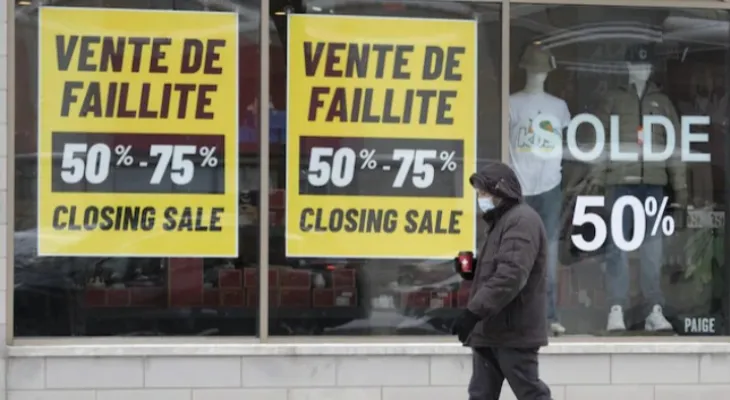Search here
Newspaper
Search here

Arab Canada News
News

Published: November 7, 2023
More Canadian companies filed for bankruptcy in the last quarter of last year than at any other time in the past decade, according to the Canadian Association of Insolvency and Restructuring Professionals, CAIRP.
Quoting the latest figures from the Bankruptcy Oversight Agency, the trustees group noted increasing instability among traders who must face sharp increases in borrowing costs and a slowdown in consumer spending.
Also, after months of uncertainty during the pandemic, many entrepreneurs are now giving in to closing their business doors, according to CAIRP Chairman André Bolduc.
Before, people were indecisive. They were waiting to see what would happen. Bolduc explained that it has now become more decisive, as people find themselves in a position where they ultimately ask themselves whether they should keep their businesses open or closed.
Also, in the third quarter of the year, 1,129 Canadian companies declared bankruptcy, an increase of 41.8% compared to the same period last year. The vast majority of them preferred bankruptcy over the proposed payment agreement.
Bankruptcy frees a business from its debts by liquidating its assets and ceasing its activities.
Bolduc also pointed out that up to 90% of companies close their doors without filing for bankruptcy. Therefore, their cessation of activities has not been recorded by the Bankruptcy Oversight Agency.
Rising raw material prices, difficulties in hiring employees, rising borrowing costs, and increasing debts are some of the factors explaining the financial difficulties faced by Canadian companies, according to Yasmin Jennet, Vice President of National Affairs.
On the other hand, current challenges have begun to undermine the morale of entrepreneurs who are trying to resist.
From his point of view, the upcoming autumn economic statement and federal budget represent an opportunity for the Trudeau government to provide assistance to small and medium-sized businesses in the country.
He emphasized that we talk a lot about the carbon tax, but there are many other taxes that small and medium-sized businesses have to pay.
The Independent Business Association also continues to pressure Ottawa to ease the repayment terms of emergency loans granted during the pandemic.
Also, after a few days' delay, companies now have until January 18, 2024, to repay their loan obtained from the Canada Emergency Business Account (CEBA), if they want to benefit from a partial exemption equal to one-third of the borrowed amount.
Entrepreneurs who do not have the means to repay their loan at this time will have until December 31, 2026, to do so, but this time without being entitled to any partial exemption.
Comments